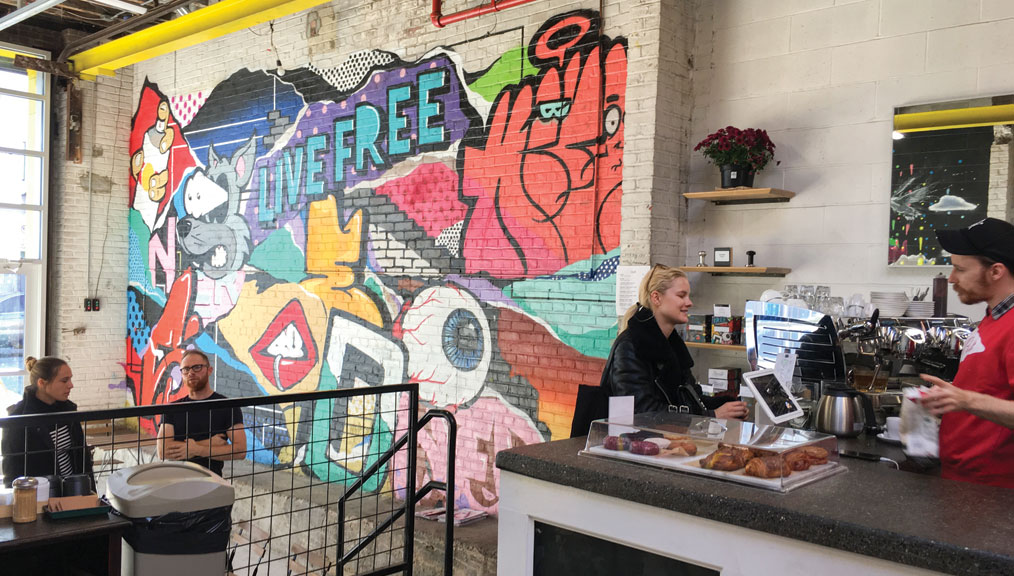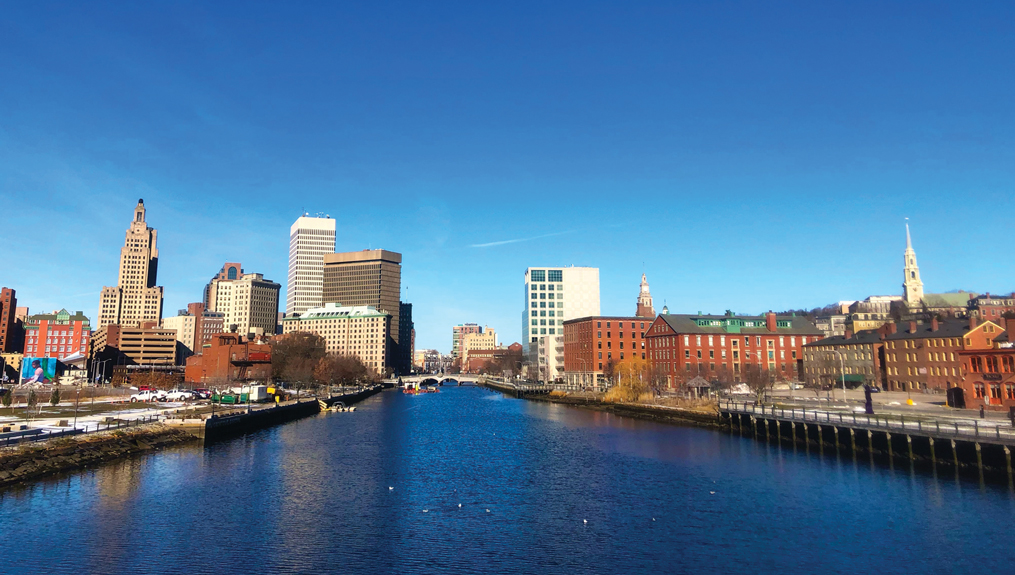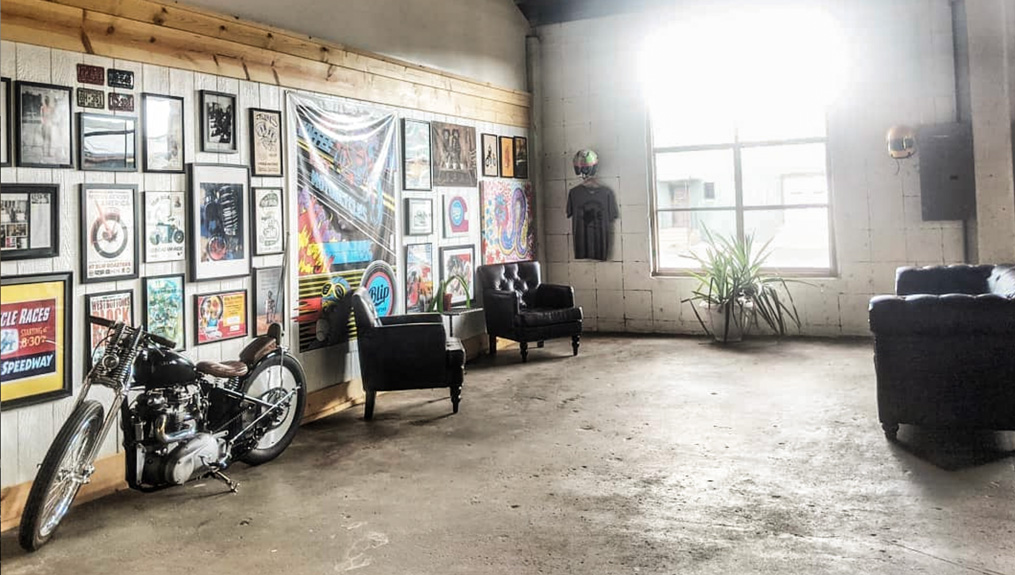[J]oe Palozzi grew up in coffee, learning the ins and outs of the industry from his father, a coffee grower and roaster. “Every single possible thing that could’ve been done in coffee, I did,” Palozzi says. This included a stint making flavored coffees in the nineties. “I smelled horrible for days,” he recounts.
But Palozzi has come a long way since his amaretto coffee–making days. He’s now vice president of operations for City of Saints Coffee Roasters. The company’s roastery resides in Brooklyn’s colorful Bushwick neighborhood; here, Palozzi stands at a tall work table, sipping a pour-over and reflecting on a coffee journey that’s helped launch a company with an ever-growing wholesale business and three retail cafés.
City of Saints began in Hoboken, New Jersey, where principal partner Matt Wade opened a coffee shop after noticing a void in the area’s third-wave offerings. Palozzi worked for a nearby roaster-retailer that supplied Wade’s shop (at the time called Red Lion Coffee), and the two developed a friendship. Wade saw the benefits of the roaster-retailer model and wanted to shape his business accordingly. Familiar with Palozzi’s long history in coffee, he invited him to partner in the roasting venture.
Wade and Palozzi started roasting their own coffee at Pulley Collective, a Brooklyn-based roasting collective geared toward small businesses and startups. Working at Pulley gave Palozzi the opportunity to operate their thirty-five-kilogram Loring to test reproducibility and repeatability of roast profiles. “We started roasting in February [2014] and by March we placed the order for this roaster,” Palozzi says, gesturing to the seventy-kilogram Loring that churns out coffee for their retail locations and wholesale accounts.
City of Saints opened its Bushwick roastery in December, 2014. With such a large capacity roaster, they rely on an Ikawa sample roaster to help them run trials before depositing large batches of five-dollar-a-pound coffee into the Loring. “You really don’t want to go into that blind,” Palozzi says, laughing.
The roastery blends perfectly into the industrial neighborhood’s eclectic tapestry of colors and businesses. Walls are painted with graffiti murals by local artists, commissioned as part of a community effort to beautify area buildings. City of Saints couldn’t get landlord approval to paint the exterior, so they worked with three different artists to cover the roastery’s interior walls. The effect is a mix of colors and artistic styles that are uniquely Bushwick. The art is also replicated on the company’s packaging.
The murals give personality to the warehouse space without hiding daily roasting operations. Large garage doors open along the street-facing wall, allowing loads of green coffee to be wheeled onto the loading dock near the Loring.
Customers sit in full view of the action, for better or worse. While patrons aren’t always understanding of the need to open and shut the doors on cold days, fast and free internet—a rarity in New York—helps patch up any hard feelings. “We’ve got a very good Wi-Fi, so we can’t be beat,” Palozzi says.
The Bushwick location wasn’t designed to be a retail café, but Palozzi says the stripped-down coffee bar has been beneficial for clients and for sampling their coffee in a variety of preparation styles. “We can really try all of our varietals, every single different way,” he says. The roastery boasts a two-group La Marzocco Linea, a Victoria Arduino Black Eagle, a Curtis G3 batch brewer, and a slew of manual brew methods.
Just as the murals of the roastery reflect the surrounding neighborhood, each café has features unique to its location. The Astor Place café in Manhattan’s East Village is sleek and polished, with Modbar modules and Marco under-counter water boilers. City of Saints’ Hoboken café is just 600 square feet, designed to facilitate mostly to-go orders; here a two-group La Marzocco Strada EE pumps out espresso, while another set of Curtis G3 batch-brewers prepare filter coffee for the masses.
Coffee is the focus, but Palozzi’s background as a pastry cook shows in the selection of baked goods at each retail location. City of Saints partnered with Doughnut Plant to develop an espresso and drip roast for the popular donut purveyor, also selling their donuts in stores. “We work with Jessie August, their director of coffee,” Palozzi says. “He comes in, tastes the coffee, and we roast to their profile.”
In Bushwick, customers can enjoy French-style baked goods from nearby L’Imprimerie. At Astor Place, treats come from Colson Patisserie, and Hoboken is stocked by local favorite Balthazar.
While Palozzi can entertain good conversation about pastries, his eyes light up when it comes to discussing the science behind roasting and looking to the company’s future. He says he’s enjoyed the consistency of the Loring, but also how it allows control over every aspect of the roast. “We’re very happy to not take anything as set and challenge our expectations of what we can do with it,” he says.
City of Saints will open two more locations in New York this winter, with plans to continue expanding the wholesale and retail sides of business.
—Ellie Bradley is Fresh Cup‘s editor.













